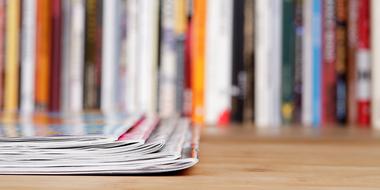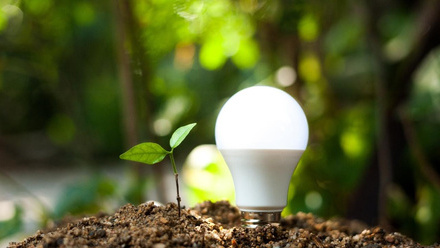The world we can save
Kate Stansfield explores ways in which translators and interpreters can make their practice more environmentally sustainable
I’ve always had a very strong interest in all things eco, ever since childhood, when I could often be found with my head in a book about animals or designing ‘Save the Whales’ posters. After realising I didn’t have quite what it took in terms of scientific aptitude to pursue my dream of becoming a marine biologist, and instead excelling at languages, my career path led me to translation. A few years ago, however, I found myself feeling that something was missing and began to realise there were changes I could make in my professional life, as well as trying to live more sustainably.
In 2019, Claire Cox wrote a feature in the Bulletin highlighting the freedom we have as freelancers to make many small changes in our working lives to help protect the environment. She covered office heating, transport, use of electrical devices, and reducing our waste. Two years and one global pandemic later, is it easier or more difficult to reduce our environmental impact?
Think globally, act locally: our individual actions
It’s certainly more urgent than ever. This article was written while the COP26 talks were being held and fewer and fewer people are denying the need to make (and stick to) pledges to keep Earth’s warming to a 1.5-degree maximum, if we are to avoid a cascade of pretty scary consequences (and people in poorer countries will be hit far, far harder). And while the big impact has to come at government and business level, it’s also important for individuals to take action too.
With the launch earlier this year of the ITI Sustainability, Horticulture, Environment and Agriculture (SHEA) Network, and ITI’s announcement in July of its commitment to the Charter for Climate Action, I am suddenly aware of a growing number of translators and interpreters who are committed to either working in the sustainability sphere or running their business in a more sustainable way (or both!). When I was asked if I’d like to write something for the Bulletin to help linguists make a positive impact, I was excited to share everything I’ve been learning over the past few years, and proud that the professional association representing us all is making such an effort to support us as we make changes in our working lives.
I was lucky enough to work recently with a group of students from the University of York as part of their Community Sustainability Champions project, which forced me to sit down and think about which areas I wanted to focus on, as well as giving me access to the results of the students’ tailored research.
Put your money where your mouth is
One thing we all have is bank accounts, and as we are business owners, a fair amount of money passes through them; which means we have enormous power to put pressure on the major banks to cut their ties with fossil fuel companies (and other investments you find ethically dubious). Here, as in other areas, a subscription to Ethical Consumer is worth its weight in gold when it comes to selecting what works for you, with reliable scores broken down into clear ratings categories. It’s particularly worth investigating the ‘big’ banks (which often score very poorly) and looking into those specifically set up for ethical purposes.
Insurance and pensions are other areas where we can wield considerable financial clout. Independent financial advisers can also be very useful with pensions (but you need to be quite firm that you don’t just want a ‘greenwashed’ policy, and explain your own criteria).
Try to tread more lightly online
This is a big one. Six months ago, I had never even heard of the term ‘digital carbon footprint’. I certainly had no idea of the impact of our online activity. But from the emails we send and the webinars we stream, to the websites we build or the work we have saved on our computer, practically everything we do online involves carbon emissions. Hardware is manufactured and shipped. Devices are powered and cooled. Data centres, where information is stored and processed, now consume around 1 per cent of the world’s electricity. Every email we send is responsible for emitting at least four grams of CO2, and that figure increases to 50g every time we send an attachment. Even more shockingly, all of the emails sent around the world in a year emit as much CO2 as seven million extra cars on the road. Overall, the information and communications technology industry is responsible for up to 3.5 per cent of global CO2 emissions – more than global aviation!
Think, too, about the other platforms where you’re storing files. More and more of us are using online platforms such as Canva for our marketing efforts – how many images are lurking there never to be used again? Are you as guilty as I am of syncing photos between your smartphone and cloud storage, and are they long overdue for a clear-out?
There are also other ways to green your online presence. Consider using a less environmentally damaging cloud storage provider, too – most of the big names have already reduced their carbon footprint by switching to renewable energy, but you can research the options to confirm the credentials of most online platforms. You may have concerns about the privacy of these services, so again it’s important to vet providers thoroughly to ensure they offer robust security features. And websites present a great opportunity to implement green practices. The Green Web Foundation can help you choose from a list of verified green hosts; and Ecograder and PageSpeed Insights can tell you how efficiently your website runs – the less processing power it uses, the less energy it consumes. Try to include only essential images and videos, and make sure they are optimised to reduce the overall size of your site; use SEO strategies to improve the findability of your content, thereby reducing the number of pages a person needs to search through to find what they are looking for (you’ll find a useful feature on SEO in the previous Bulletin); and bookmark the websites you visit frequently rather than going via a search engine (the more pages visited, the more data processed).
You can also use Greenpeace’s brilliant Click Clean Scorecard website and browser extension to check the performance of major online platforms (from Netflix and Facebook to Hootsuite and eBay), highlighting services that offer transparency and good energy performance.
Then there are the multiple devices we’re all using and juggling between. They’re essential to our working lives, but they also often suck us into a cycle of increasing consumerism, exacerbated by built-in obsolescence and the power of big-name marketing. We can start by making our devices last as long as possible and being mindful when it comes to replacing and disposing of them. When your phone contract expires, can you switch to a SIM-only contract without upgrading the phone, or consider a more ethical phone contract provider or manufacturer? When you’re replacing your computer, can you find a refurbished or pre-loved model? And can the present model be wiped and passed on? (The Restart Project can direct you to charities that donate laptops to people who can’t afford new ones.) There are various ‘offsetting’ schemes available too, but they have varying reputations. If you do go down this route, do check that your scheme is ‘Gold Standard’.
Clients and customers: the other choices we make
But what about the dilemmas we’re faced with when we’re taking on a project? This is something I’ve discussed with fellow translator Beth Burleigh, who shared her experience of having rejected a project for an airline company on environmental grounds. It’s something we need to talk about more openly – because it isn’t always easy.
You may even want to take this further and create a policy, either for your own reference or published on your website. Beth also makes the very handy suggestion of drawing up an email template to have ready to go when requests come in that are not in line with your core values. This makes declining the work far less stressful.
Above all, let’s not be too hard on ourselves. It can certainly help to be informed about the biggest culprits when it comes to environmental and ethical record, and to be familiar with common greenwashing tactics, but putting yourself under too much pressure to work only with clients with a perfect record could be a shortcut to stress. As with any positive changes we make in our businesses, we need to start with baby steps, and beating ourselves up over the clients we work with to pay our bills isn’t going to help the planet in the long run. I always like to remember that quote from the wonderful Maya Angelou: ‘Do the best you can until you know better, then when you know better, do better.’
We are multiskilled individuals with a great deal to offer a wide range of groups, but there is also a lot of power in sharing the changes we are making with our contacts online and in person, starting conversations and inspiring other business owners to make changes too. According to the gov.uk website, SMEs (small and medium-sized enterprises) account for 99.9 per cent of the business population (5.6 million businesses). So you see, together we are many, and we can make a LOT of noise! We definitely don’t have to leave all the positive changes up to the world’s major corporations.
A few helpful resources to help you live and work more sustainably:

- Ethical Consumer website
- Gerry McGovern’s website on World Wide Waste
- Learn about green website design
- Discover the carbon footprint of all sorts of things
- A very thorough, science-based carbon footprint calculator
- Office furniture recycling solutions
- Find out where to donate your old laptop
- A useful blog on tree planting through your business, with a range of freelancer perspectives
Never miss another Bulletin article

If you would like to read more features and articles on a wide variety of subjects relating to all aspects of the translation and interpreting industry, subscribe to ITI Bulletin. Alternatively, join ITI and get a free subscription included in your membership.






